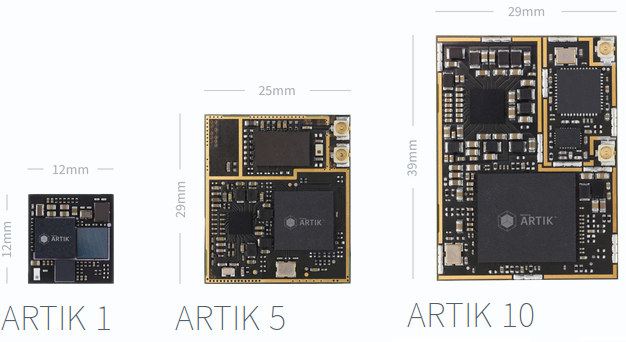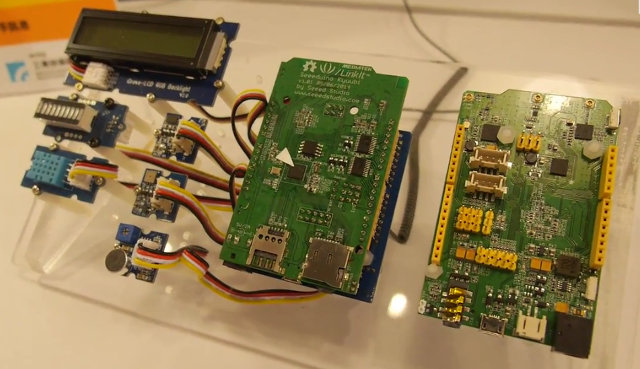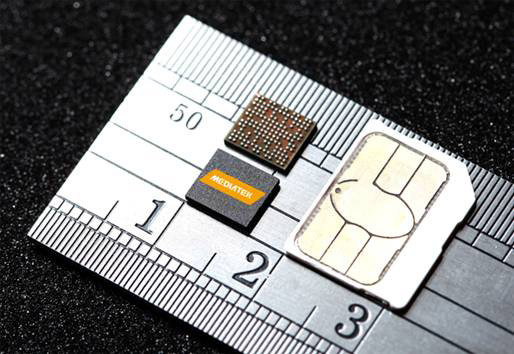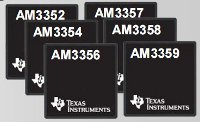Samsung Artik IoT boards will finally start selling on February 22 via Digikey. With the many fascinating developments in the IoT space over the year, you’d be forgiven if you completely forgot about Samsung Artik boards. So let’s have a quick recap. The Korean company previously announced three boards all supporting Bluetooth LE: Artik 1 – Ineda Systems Dual Core microAptiv MIPS32 processor with 1MB on-chip RAM, no GPU, and 4MB SPI flash Artik 5 – Dual core Exynos ARM processor @ 1GHz with ARM Mali 400 MP2 GPU, 512MB RAM and 4GB eMMC flash (both on-chip), with WiFi & Zigbee/Thread connectivity Artik 10 – Octa core Exynos processor with 4x ARM Cortex A15 @ 1.3GHz, 4x ARM Cortex A7 @ 1.0 GHz with ARM Mali-T628 GPU, 2GB LPDDR3 (on-chip), 16GB eMMC flash, and WiFi & Zigbee/Thread connectivity Samsung also partnered with multiple companies working on: Operating Systems – Tizen, […]
Samsung Artik is a Family of Arduino Compatible Boards for IoT Applications
There was a time when development boards were only reserved to companies, then boards like Arduino or Beagleboard made these available and affordable to consumers, and with the introduction of the Raspberry Pi, the maker movement grew even more rapidly, and many low cost boards started to be designed and manufactured mostly my smallest companies. But now larger companies like Intel or Qualcomm have jumped on the makers’ bandwagon, and the latest entry is Samsung with their Artik platform currently comprised of three boards that are programmable with the Arduino IDE. Let’s go through specifications for the three boards: Artik 1 SoC – Dual Core MIPS32 processor @ 250MHz (microAptiv UP) and 80MHz (microAptiv UC) without GPU Memory – 1MB RAM on-chip Storage – 4MB SPI flash Display – Up to WVGA (800×480) Connectivity – Bluetooth Low Energy with chip antenna Security – Secure element Sensor – 9-axis motion sensor […]
More Details on Mediatek MT2502 Aster SoC and Linkit Platform for Wearables (Video)
Last month, Mediatek announced their Mediatek MT2502 SoC for wearables, codenamed Aster, as well as the Linkit development platform targeting the developer’s community. But at the time they did show the actual hardware, and thanks to Charbax we know have more interesting details about Aster and Linkit. First they compare a design based on Aster to Samsung Galaxy Fit wearable band, and show why it uses less space, will cost less, and they claim over twice the battery life. Simple and smaller design (~36% reduction in size) Aster solution – MT2504 (6.2 x 5.4 mm) plus all required resistors, capacitors and inductors require 89.97 mm2 Galaxy Fit – MCU. Bluetooth Transceiver, external memory, a linear charger, and all required resistors, capacitors and inductors require 140.97 mm2 Battery life – Samsung Galaxy Fit is supposed to last between 1 and 1.5 days on a charge, whereas devices based on Aster should last about […]
MediaTek Unveils LinkIt Platform with MT2502 Aster SoC for Wearables and IoT Applications
After Ineda Systems Dhanush SoC and SHASTRA Devkit, here’s another Wearable SoC and development kit for today with Mediatek announcement of their LinkIt platform providing both hardware and software to develop wearables and IoT applications using their Aster SoC for wearables. Key features of LinkIt platform listed on Mediatek Labs: MediaTek Aster (MT2502) measures only 5.4 x 6.2mm and is specifically designed for wearable devices Developer platform supported by reference designs that enable creation of various form factors, functionalities and internet connected services Synergies between microprocessor unit and communication modules, facilitating development and saving time in new device creation Modularity in software architecture provides developers with high degree of flexibility Supports over-the-air (OTA) updates for apps, algorithms and drivers Plug-in software development kit (SDK) for Arduino and VisualStudio; planned (Q4 2014) support for Eclipse Hardware Development Kit (HDK) based on LinkIt board by third party No details have been provided for […]
TI Unveils Sitara AM335x ARM Series Cortex-A8 Processors
Texas Instruments has just announced the new Sitara AM335X Processors and the low cost Beaglebone development board. The low cost Cortex-A8 SoCs start at 5 US dollars per piece and are aimed at upgrading ARM9 solutions (software compatible) and adding new features such as 3D interfaces and touch screen, high resolution displays with faster performance. Texas Instruments says you could take those new upgraded products to market within 6 months thanks to their inexpensive development board (Beaglebone) and complete SDK. There are six models in the Sitara AM335X series: AM3552: Cortex A8 up to 720 MHz. AM3554: Cortex A8 up to 720 MHz with 3D Graphics (PowerVR SGX GPU). AM3556: Cortex A8 up to 720 MHz with programmable real-time unit (PRU) @ 200 Mhz. AM3557: Cortex A8 up to 720 MHz with PRU @ 200Mhz and EtherCat. AM3558: Cortex A8 up to 720 MHz with 3D Graphics and PRU @ […]
Mentor Embedded Inflexion UI Demo for STB/IPTV
Mentor Embedded developed a user interface for STB/IPTV demo using their Inflexion UI framework and they showcase it at ARM Techcon 2011. The demo runs on Android and looks very smooth thanks to OpenGL ES hardware acceleration. They also have a separate demo with pandaboard and a laptop running Sourcery codebench development tool to show how to develop a simple user interface with Inflexion UI. Finally, they showcase “Stella“, a self-balancing robot with 2 wheels. The board is based on TI Stellartis (Cortex M3) micro-controller and runs Mentor Embedded Nucleus RTOS. Jean-Luc Aufranc (CNXSoft)Jean-Luc started CNX Software in 2010 as a part-time endeavor, before quitting his job as a software engineering manager, and starting to write daily news, and reviews full time later in 2011. www.cnx-software.com







